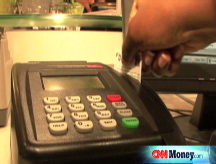Americans $1.7 trillion poorer
Americans' net worth falls for the second straight quarter as home and stock prices decline, but it may not hurt consumer spending, experts say.
NEW YORK (CNNMoney.com) -- Americans saw their net worth decline by $1.7 trillion in the first quarter - the biggest drop since 2002 - as declines in home values and the stock market ravaged their holdings.
Meanwhile, the amount of equity people have in their homes fell to 46.2%, the lowest level on record.
The net worth of U.S. households fell 3% to $56 trillion at the end of March, according to the Federal Reserve's flow of funds report, which was released Thursday.
The value of real estate assets owned by households and non-profits declined by $305 billion, while financial assets fell by $1.3 trillion, led mainly by a $556 billion drop in stocks and a $400 billion decline in mutual funds.
The first quarter's decline follows a $530 billion drop in wealth in the fourth quarter of 2007. Until then, net worth had been rising steadily since 2003, climbing nearly 31% over those five years. During the bear market of 2000 through 2002, household's net worth dropped 6.2%.
The recent declines, however, may not affect consumer spending, said Michael Englund, senior economist with Action Economics. Americans have actually spent more in recent months, particularly at the gas pump as fuel prices soared.
Americans "are spending everything in their wallet and borrowing more," Englund said. "But because the pump takes so much more of their dollars, they are buying fewer T-shirts."
Still, as people feel begin to feel poorer, the growth in consumer spending may slow, said Scott Hoyt, senior director of consumer economics at Moody's Economy.com.
"When wealth goes down, consumers will cut back some," he said. "There will be a drag on spending."
Household debt grew by 3.5% in the first quarter, down from 6.1% in the fourth quarter. The growth of home mortgage debt, including home equity loans, cooled to an annual rate of 3%, less than half the pace of 2007. Consumer credit, which includes credit cards, rose at an annual rate of 5.75%, the same as the 2007 pace.
The fact that consumers continue to borrow against their homes, even as they decline in value, shows how troubled Americans are.
"It signals how consumers are struggling to get cash," Hoyt said.
The Fed's report comes at a time of growing anxiety about the nation's economic health. Many economists believe the country is already in a recession, if not headed toward one.
In the first four months of the year, employers cut 260,000 jobs, and on Friday the government is expected to report an additional 60,000 losses in May. Gross domestic product rose at a sluggish annual rate of 0.9% in the first three months of the year, when adjusted for inflation.
Whether household wealth will be up or down at the close of 2008 depends more heavily on the stock market's performance than on housing values, since financial assets account for about two-thirds of net worth. Because the stock market has been rising in recent months, Englund is expecting a 6% gain in net worth for the second quarter.
As for the year?
"The jury is really still out," said Englund, adding that wealth could end up flat for 2008.
Are you buried under a pile of debt and need help getting out? Did you recently manage to pull yourself out of debt and want to share your story? Tell us about your experience with debt and how the current credit crisis is affecting you. Send us your photos and videos, or email us to share your story. ![]()


